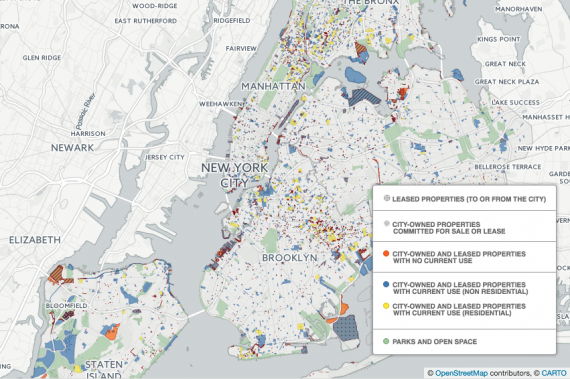City agencies control 14,000 properties across the five boroughs — but a hefty chunk of these aren’t being used, a new study argues.
Roughly 20 percent of the 43,000 acres owned or leased by the city are classified as having “no current use,” the Municipal Art Society of New York found in a recent study. A majority (2,726) of these 3,162 properties are vacant, according to the report. MAS noted that the amount of underutilized land is twice the size of Central Park and that all the property controlled by city agencies spans roughly the size of Brooklyn.
“New Yorkers deserve to know that we collectively carry the cost, but also potential profit, on land holdings as large as Brooklyn,” Gina Pollara, president of MAS, said in a statement. “These findings raise serious questions about whether our city’s available property is being appropriately leveraged for civic benefit.”
Melissa Grace, a spokesperson for the mayor, said that the administration is “focused on developing affordable housing, building and modernizing our parks, libraries and schools — and doing so in a manner that ensures community engagement.” She added, “To suggest that there are acres and acres of underutilized properties that are being ignored by the City is simply untrue.”
MAS released “Public Assets: City-owned and Leased Properties” as part of its efforts to encourage more transparency when it comes to city planning. In its report, MAS noted its support for legislation that would make several different city datasets available to the public, including one that would detail any property with a deed restriction sold by the city. In May, Council member Margaret Chin introduced a bill that would require the city to update a searchable electronic database with this information. The bill came in response to the controversial sale of Rivington House after the city lifted a deed restriction on the property that required the property’s use as a nursing home.
The two agencies that lease or own a majority of the underutilized property — those classified as having no current use — are the Department of Housing Preservation and Development and the Department of Citywide Administrative Services, the agency that lifted Rivington’s deed restriction.
Most of the unused property is located in Brooklyn and Queens — respectively, 1,071 and 1,143. Only 183 properties are in Manhattan.
To be fair, roughly one-third of these the properties with no current use span less than 1,000 square feet, making the development of individual properties tricky, the report states. The city is committed to either selling or leasing out 1,727 of its total 14,000 properties, MAS noted in its report. Roughly 70 percent of these committed properties also designated as having no current use. The report doesn’t recommend specific uses for the properties, but urges the city to study the holdings and any potential development opportunities.
In a February 2016 report, city Comptroller Scott Stringer lamented that the city owned more than 1,100 vacant lots that could potentially be used for affordable housing. The city said Stringer’s report was unfair, arguing that about 700 of the properties were either in flood zones, were unsuitable for residential development or were already scheduled to be developed within the next two years.
